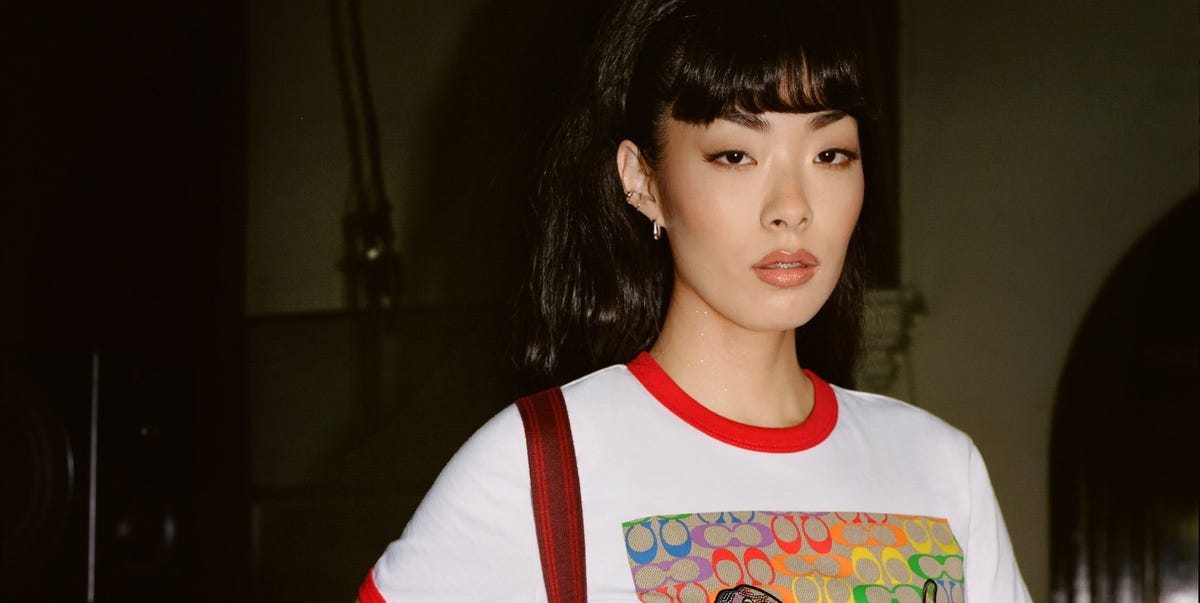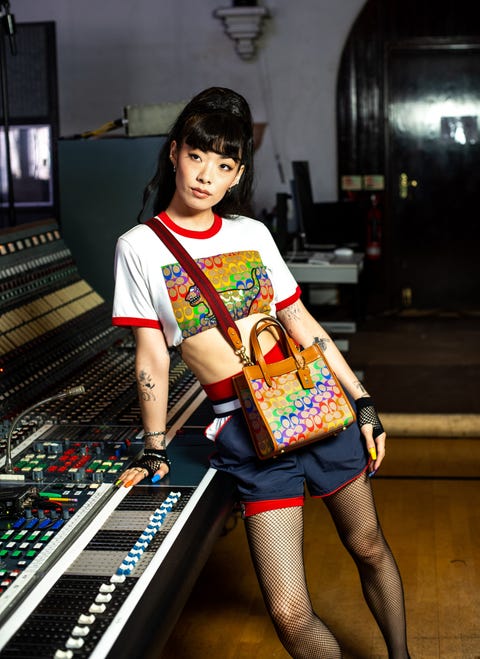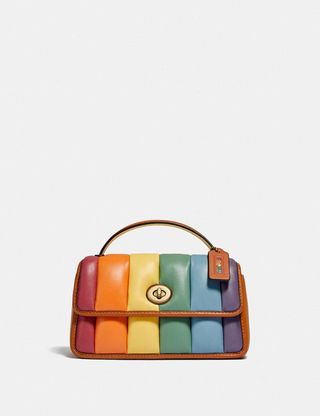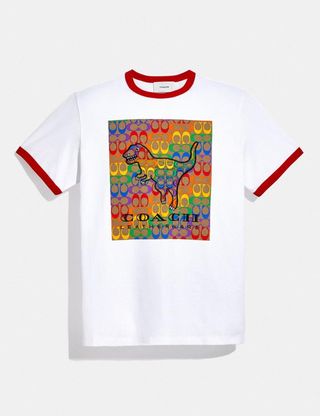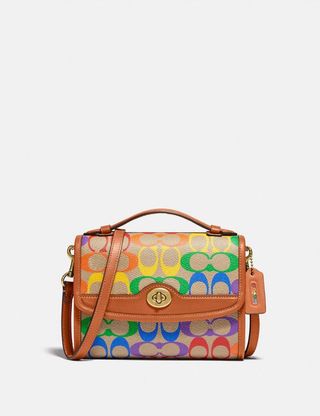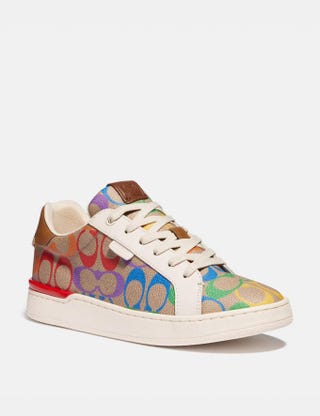Rina Sawayama has been influencing pop since the day she appeared on the scene with “Sleeping in Waking” in 2013. But it wasn’t until her 2020 album SAWAYAMA, which topped all the notable “Best of” lists last year, that we began to truly appreciate her. She explored the depths of herself, breaking Rina down into the stereotypes that both define and misrepresent her: Female. Queer. Asian. Pop star. But like everyone, the Japanese-British singer-songwriter is more than a culmination of nouns. And she’s willing to talk about it, both in her music and in the way she engages with the world. With a 2000s-era Christina Aguilera voice, a touch of an awkward pop-punk pop phase, and nu-metal vocals reverberating in the background, Sawayama brings the depths of her life experiences to her music, creating a nostalgic sound with explicitly relevant subject matter. Rina Sawayama is our modern pop star, contrasting melodic beats with heady topics, exploring the scope of sexuality and fetishization in 4/4 time. Dance music with depth.
In an effort to break through the stigmatization and hate, Sawayama’s dialogue extends beyond her music on the topics that matter. She harnesses her platform to discuss Asian hate, Black Lives Matter, trans rights, and even meme-ifies the fetishization of Asian women (also directly addressed in her video for “STFU”). Today, she is the face of Coach’s new campaign, Pride Is Where You Find It. Without IRL events this year, the brand is redefining Pride as a state of mind. It’s a fitting sentiment in a time when we question celebratory “heritage months” in favor of year-round allyship for underrepresented communities. In addition to the campaign, the Coach Foundation made donations to the Hetrick-Martin Institute, Albert Kennedy Trust, Point Foundation, and CenterLink Community of LGBTQ Centers as part of its Dream It Real initiative.
This content is imported from YouTube. You may be able to find the same content in another format, or you may be able to find more information, at their web site.
“I’ve never worked with a female-slash-queer-only crew before. It’s rare,” Sawayama tells me over Zoom after a long day shooting with Coach. Inclusivity is a big part of her work, and despite the exhaustion in her voice, she’s compelled to discuss it. Read on to see what the artist has to say about the biggest misconceptions of bisexuality, Elton John, and what to do if a man fetishizes you, with exclusive behind-the-scenes images from her campaign shoot.
What is your personal history with Coach?
I feel so honored to join the Coach family. I got this necklace when I was young, I think I was thirteen. My sister gave me a Coach necklace and I literally have worn it every single day until I lost it last year and it breaks my heart. It’s very 2000s. It’s wild to think that I’m doing the campaign while also celebrating pride, which is important since we can’t do festivals and stuff.
You have a song titled “Chosen Family,” which is especially important for LGBTQIA+ youth. What was it like meeting yours?
Without them, I wouldn’t have lasted through university. I was really struggling at university and that’s when I found my chosen family. They were also struggling, getting bullied or ostracized, and they all happened to be queer. I was very stressed. Finding them was super important. It saved me from a situation where I was getting bullied in university. And at so many points in my life, they’re the ones I go to to ask for advice, and also, they’re each on their own journey of queerness and following their heart. And we try to be there with each other talking about things we can’t talk about with our birth families.
Is Elton John part of your chosen family now?
He was the one who said “you’re part of my chosen family!” He rings me all the time and it’s so sweet. He just calls me, very brief, he’s all, “I just saw you in this magazine and I just want to say I’m so proud of you.” I really think he connected with the song and values the idea of chosen family. And I know people of all ages who connect with that idea and who find it so important that they have one.
As a queer Asian, you’re subverting what the image of a pop icon looks like. What does that feel like?
I think there’s this amazing wave of people being able to tell their stories. I think it’s also the democratization of music in general, the fact that you don’t have to be a big label to put music out. That means that people like me or Dorian Electra can do our version of pop without having to jump over hurdles like we would have to do if we were releasing music back in the nineties.
Can you describe a moment where you felt like you were being stonewalled in the industry because of your sexuality or your Asian identity?
I think all of these things are invisible. Kind of a glass ceiling. When I was starting out in music there were only a handful of Asian artists, especially in pop. And even now just a few years later, I’m seeing so many more people and that’s amazing. I love that the pioneers of the first ones who were visible, the fact that they’re Asian is not the main thing. They’re just being part of this very diverse landscape. To be respected for what you do and your skill. In “STFU.” for example, that whole dialogue was taken from a conversation that I had at a wedding. I got frustrated no one was asking me what my skills were or what I do for a living, things that I find more interesting than just my ethnic identity.
Has it changed over time?
It’s slowly changing. Behind the scenes, I don’t think there are enough queer people at upper management of the labels. It’s so not diverse at all but it’s slowly happening. That’s why I try to work my hardest so that things can become more diverse and I can ask. I think it’s up to the individual artist to check themselves. Surprisingly a lot of queer artists will not have teams that represent them, so I think it’s important to keep that in check.
What you think are the biggest misconceptions about bisexuality or pansexuality?
Oh my god, where do I start? Just because you’re in a heterosexual relationship does not mean that you’re not queer. I think that’s one of the main things. Or just because you’re in a gay relationship that doesn’t mean you’re not bisexual. I think that it’s also important to stress that some people have preferences and some people might prefer having sexual relationships with men but then having relationships with women, and that’s totally fine. I’m trying really hard to eradicate this idea that you can’t make your mind up or whatever. I think if you do identify as gay or a lesbian I think a lot of people I know who do identify as such, that’s the box that they fit 80 or 90 percent of the time. But because there are these labels they feel comfortable in them, but some people can discriminate against those who don’t fit rigidly within those, and that stops people from people expressing their actual identity.
You’ve also been really vocal about Asian hate and discrimination, and internalized racism. What helped you move beyond that and embrace that side of you?
It’s a daily process. I don’t think you graduate from it. I think you learn to accept that you can’t change everyone’s minds, but what I can do is make art and music that I feel passionate about. And I’ve been vocal about anti-Asian hate or fetishization of Asian women since the beginning of my career— since I’ve noticed it really. It’s really important to me because I think it’s important for artists to speak up when they see it.
When Asian hate was really boiling over in the States, I didn’t see enough people posting about it, like the people who love aikido art or might be referencing dragons. You know, people who love anime or Asian culture but they weren’t talking about it. So it’s really important for me to talk about it in my music or interviews because it’s something I genuinely feel passionate about.
Do you have advice for Asian women when they experience fetishization?
Oh god, I still haven’t quite figured that out for myself, to be quite honest. I’ve actually spoken to people around me so that they can stop it from happening. So many times I’ve been at a party where I’m meeting new people where it happens to me and it has always been my friends that have stepped in and been like “That’s not okay.”
I remember I was at a party just after Trump got inaugurated, and there was this guy at the house party that was so weird. We were hanging out and getting to know each other just on a friendly basis and then someone else joined the conversation and he said, “Sorry, you don’t speak English,” and just walked away. It was so weird. So my friends all stepped in and kicked him out of the party and we went bowling so it was great. Making sure your friends know that it’s a big deal to you and being like “It’s fine, it’s fine”—it’s not fine. It’s not up to the people who are being harassed to sort out the problem, with everything, with BLM. It’s not for them to sort it out.
This content is imported from Instagram. You may be able to find the same content in another format, or you may be able to find more information, at their web site.
What was teenage Rina like? Did she have a Myspace?
She had multiple Myspaces because I had a band. I recruited on the back of Enemy, the magazine, which is so dangerous to think about now. I went to meet them in a garage. I was so fearless it was wild. It was bad because I hated my parents and my mom. From 7 in the morning, we’d have yelling and screaming arguments, and then I’d go off to Paris on my own to see gigs. It was definitely a rebellion. I would not be going to school. I had so much fun and I got so much partying out of the way from 13 to 16 so now I’m a grandma. By the time I got to uni I was done partying.
Your music embraces that awkward 2000s era of pop metal emo. We’re seeing that aesthetic revived with the Gen Z. How does it feel to see that music and style be considered cool again?
It’s awesome, but also weird because it’s like, “were you alive through that?” Because they’re obsessed with the ‘90s but they weren’t alive in the ‘90s.
This content is created and maintained by a third party, and imported onto this page to help users provide their email addresses. You may be able to find more information about this and similar content at piano.io
